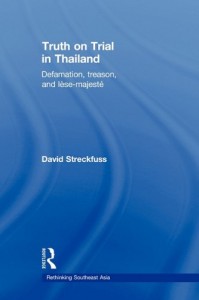 In our previous review of Paul Handley’s book The King Never Smiles, we quoted from the book’s back cover: “Any journalist or academic who takes an interest in Thailand soon learns that one topic is off limits: the modern monarchy… it is dangerous, and one risks expulsion or jail for lèse-majesté” for reporting on sensitive matters relating to the royal family. And deeper into the weighty, difficult, challenging, murky morass of Thai law relating to lèse-majesté wades author David Streckfuss, in his impressive monograph Truth on Trial in Thailand: Defamation, Treason, and Lèse-Majesté (2011, ISBN 978-0-415-67574-1).
In our previous review of Paul Handley’s book The King Never Smiles, we quoted from the book’s back cover: “Any journalist or academic who takes an interest in Thailand soon learns that one topic is off limits: the modern monarchy… it is dangerous, and one risks expulsion or jail for lèse-majesté” for reporting on sensitive matters relating to the royal family. And deeper into the weighty, difficult, challenging, murky morass of Thai law relating to lèse-majesté wades author David Streckfuss, in his impressive monograph Truth on Trial in Thailand: Defamation, Treason, and Lèse-Majesté (2011, ISBN 978-0-415-67574-1).
Streckfuss here offers a telling historical chronology of Thai defamation laws, dating back to the 19th century, with a number of charts illustrating their effects and punishments. This well-researched book isn’t a quick read, but it’s an important one, full of surprisingly intricate analyses of Thai laws, governmental minutiae, and politics. Hold onto your hats: here are wonderfully insightful essays on Thainess, military coups, and Theravada Buddhism. These all contribute mightily to the arcane series of edicts that comprise the lèse-majesté laws that result in stiff prison sentences for those found guilty of libeling or slandering the royal family, its agents, the government, or the Buddhist faith. As the author points out, from a practical perspective, it’s virtually impossible to defend oneself after being charged, the laws being overly broad and full of gray areas that are a boon to prosecutors. And for the person charged, even bail becomes an issue. For a newspaper editor, for instance, bail sometimes must be paid to three entities, the police, the prosecutors, and the court. A case, with all fees and upfront costs, could total 300,000 baht ($ 9,402 USD), so, as one interviewee suggests, 20 to 100 cases per year could cost a newspaper dearly.
From our perspective, this issue with newspapers leads neatly to our favorite entry of the book, an interview with Police Lt. Col. Samphan Satthaporn, the Press Officer of Bangkok who oversaw the enforcement of Order No. 42 from 1976 to 1991. This magnificent seven page excerpt is found in the Defamation and Truth chapter under the heading of Truth in news. Samphan is a fascinating character that could easily be novelized and the author admits to finding him to be “colorful and gracious.” Samphan virtually romps through examples of lèse-majesté edicts applied to press situations, delving into issues such as the King’s picture placement on a newspaper page, to vulgar words, to the treatment of Buddhist monks. It’s a wonderful passage for anyone who has wondered why certain high-profiled news stories never get reported in Thailand, told with a certain amount of glee by the effervescent police colonel.
There is a lot in this 315 page book (488 pages, if you include the notes, appendix, and index), and the concepts of Defamation and Truth are at its core. Here at WoWasis, we’ve always considered “truth,” as we know it, to be a Western construct that has little to do with how the concept is regarded in Thailand. For years, visitors have used the term “bargirl truth” to describe anything a Thai girlfriend wants to tell a man as what she thinks he wants to hear, or what she feels that he should want to hear. It often has little to do with actual facts. Streckfuss spends a considerable amount of time discussing the concept of truth in Thailand:
Thailand stands at one end of the continuum of defamation regimes, where its defamation laws — especially the lèse-majesté law — have banished truth from the public sphere, where truth is translated in a complex world of signs decipherable only by modern-day People of Virtue. Truth exists in the margins and veiled worlds of the private sphere, hidden deep within the national institutions of rumour and gossip.
We agree with the author, but suggest that the issue is much wider in scope than in politics alone. Obfuscating the truth (again, from a Western perspective) is a national pastime.
The concept of Defamation, particularly as it relates to a political regime, forms a major discussion point of Streckfuss’ book, and includes fascinating minutiae, such as his description of a court case involving a man who was arrested for wearing a pair of socks sporting the Thai flag (feet are often a problem in Thailand; simply pointing them at someone or stepping on a windblown Baht note to keep it blowing away — the King’s visage is on the note — are insults).
This book is an important one, and the author’s research chops are formidable. The book serves as a critical history of Thai law, with a discussion of how lèse-majesté encompasses the world of the monarchy, politics, law enforcement, and religion in Thailand. It’s not difficult to see why this book is banned in Thailand, as even the discussion of many of the topics addressed in the book are seen there as volatile.
For non-Thailand based readers wishing to see under the skin of the Land of Smiles, this book offers a compelling microscope. Buy it now at the WoWasis eStore.
[…] analysis of the political machinations of a most complex country. Along with David Streckfuss’s Truth on Trial in Thailand: Defamation, Treason, and Lèse-Majesté and Paul Handley’s The King Never Smiles, it is essential reading for those desiring to know what […]
I love that old line about books being the best weapons…